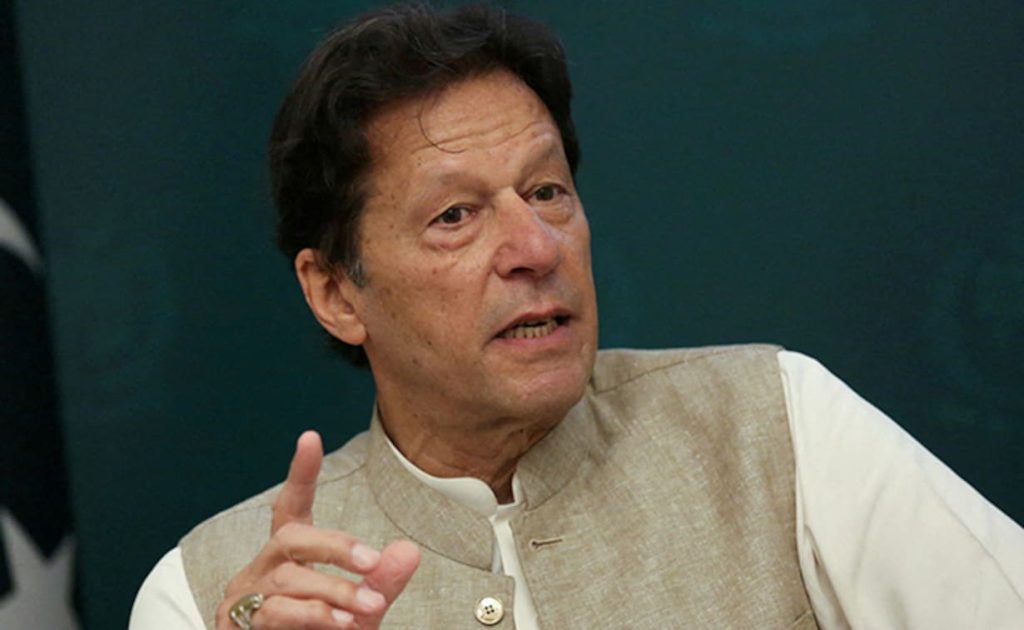Toshakhana case: IHC suspends Khan’s arrest warrant till March 13
Court also directs him to ensure his appearance before lower court on March 13
ISLAMABAD ( Web News )
The Islamabad High Court (IHC) on Tuesday suspended the arrest warrants of Pakistan Tehreek-e-Insaf (PTI) chairman and former prime minister Imran Khan in the Toshakhana case.
IHC Chief Justice Amir Farooq, while accepting Imran Khan’s plea against Additional Session Judge Zafar Iqbal’s decision, pronounced the reserved verdict.
The court also directed Khan to ensure that he appears before the lower court on March 13.
Earlier Tuesday, the Islamabad High Court (IHC) had reserved the verdict on Pakistan Tehreek-e-Insaf (PTI) Chairman Imran Khan’s petition against the non-bailable arrest warrants issued for him in the Toshakhana case. Khan had moved the IHC to rescind the warrants issued by a sessions court due to his multiple absences from appearing before the court to save indictment earlier today.
His lawyer argued that he could not appear before the court because the day he was summoned by the sessions court was the day when Khan had to appear before three other courts. The court subsequently issued arrest warrants for him followed by the capital police’s attempts to arrest him.
Justice Amir Farooq inquired what would happen if he rescinded the warrants. “The court has summoned him for indictment only as the law has to be acted upon”, he remarked. How else the court should summon him, he inquired further. Khan should seek exemption after indictment if he willed, he remarked.
IHC chief justice Amir Farooq inquired when Khan would appear for indictment. Could you inform the court after consultation with the PTI chairman, he implored. He remarked that Khan had to appear before the IHC on March 9, so he could also appear before the other court. Apprise me of a date for indictment so I may write to the trial court of the date, he remarked.
He remarked that everyone was facing security threats here and not just Khan. PTI chief’s lawyer argued that Khan would appear within four weeks before the sessions court. The CJ remarked that it was not practical and it meant Khan would not appear before the IHC on Thursday too. Then let the IHC apprise the sessions court that it must bring Khan under trial as an absconder, he remarked.
Khan’s lawyers argued that he could not appear before the sessions court as the IHC had ordered him to appear on March 9 before it, to which the CJ remarked that it was the reason why his case had been fixed for hearing at 3pm. “Appear before the court at ease”, he remarked.
The PTI chief’s lawyers has pleaded the high court to fix the case for hearing today (Tuesday) and cancel the warrants. The petition comes as Additional Sessions Judge Zafar Iqbal is hearing the Toshakhana case.
The former prime minister has thrice skipped indictment hearings in the district and sessions court in the case initiated at the request of the Election Commission of Pakistan (ECP) for concealing the details of gifts he retained from the Toshakhana while in the power.
Additional Sessions Judge Zafar Iqbal was set to frame charges against him on Feb 28, but his lawyer sought exemption from the hearing as he had to appear before other courts in the capital city. The judge had then issued non-bailable arrest warrants for the PTI chief and adjourned the hearing till March 7.
A day earlier, the sessions court rejected a plea filed by Khan seeking annulment of the non-bailable arrest warrants issued against him for his failure to appear before the court. The court had announced the verdict on the plea filed by Khan’s lawyers Qaisar Imam, Barrister Gohar and Ali Bukhari.
Imam had demanded the annulment of the warrants, arguing that the law barred the issuance of arrest warrants to some extent if the plea was filed as a private complaint. Additional Sessions Judge Zafar Iqbal remarked that Khan’s lawyers had apprised the court the day the warrants were issued that their client would not appear before the court.

